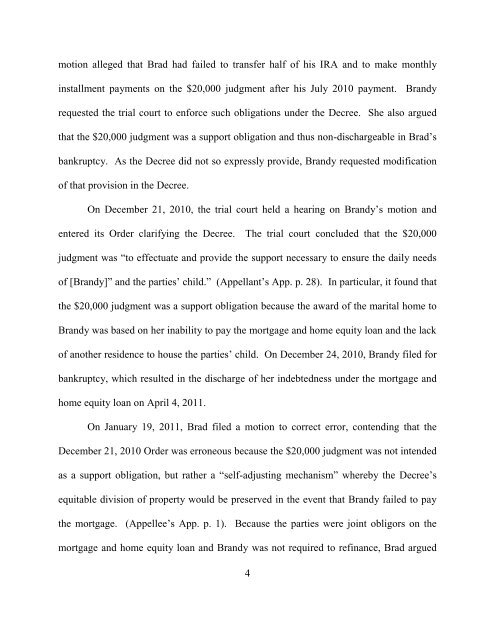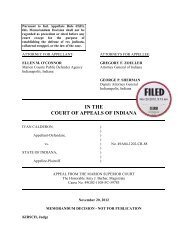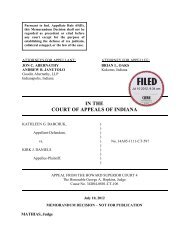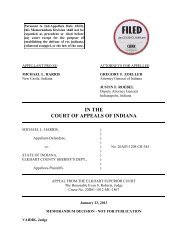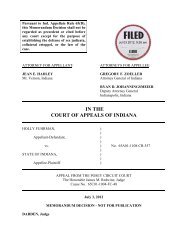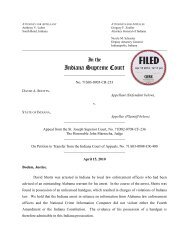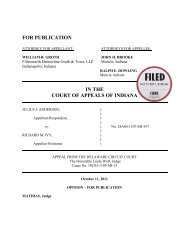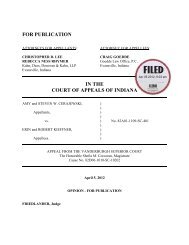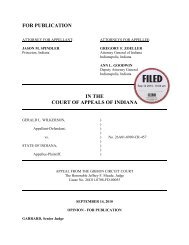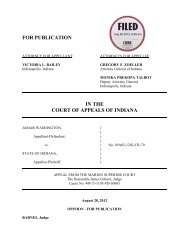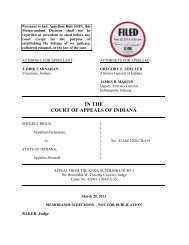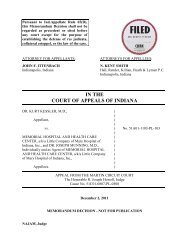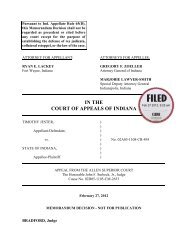Brad A. Fisher v. Brandy Fisher - State of Indiana
Brad A. Fisher v. Brandy Fisher - State of Indiana
Brad A. Fisher v. Brandy Fisher - State of Indiana
Create successful ePaper yourself
Turn your PDF publications into a flip-book with our unique Google optimized e-Paper software.
motion alleged that <strong>Brad</strong> had failed to transfer half <strong>of</strong> his IRA and to make monthly<br />
installment payments on the $20,000 judgment after his July 2010 payment. <strong>Brandy</strong><br />
requested the trial court to enforce such obligations under the Decree. She also argued<br />
that the $20,000 judgment was a support obligation and thus non-dischargeable in <strong>Brad</strong>’s<br />
bankruptcy. As the Decree did not so expressly provide, <strong>Brandy</strong> requested modification<br />
<strong>of</strong> that provision in the Decree.<br />
On December 21, 2010, the trial court held a hearing on <strong>Brandy</strong>’s motion and<br />
entered its Order clarifying the Decree. The trial court concluded that the $20,000<br />
judgment was “to effectuate and provide the support necessary to ensure the daily needs<br />
<strong>of</strong> [<strong>Brandy</strong>]” and the parties’ child.” (Appellant’s App. p. 28). In particular, it found that<br />
the $20,000 judgment was a support obligation because the award <strong>of</strong> the marital home to<br />
<strong>Brandy</strong> was based on her inability to pay the mortgage and home equity loan and the lack<br />
<strong>of</strong> another residence to house the parties’ child. On December 24, 2010, <strong>Brandy</strong> filed for<br />
bankruptcy, which resulted in the discharge <strong>of</strong> her indebtedness under the mortgage and<br />
home equity loan on April 4, 2011.<br />
On January 19, 2011, <strong>Brad</strong> filed a motion to correct error, contending that the<br />
December 21, 2010 Order was erroneous because the $20,000 judgment was not intended<br />
as a support obligation, but rather a “self-adjusting mechanism” whereby the Decree’s<br />
equitable division <strong>of</strong> property would be preserved in the event that <strong>Brandy</strong> failed to pay<br />
the mortgage. (Appellee’s App. p. 1). Because the parties were joint obligors on the<br />
mortgage and home equity loan and <strong>Brandy</strong> was not required to refinance, <strong>Brad</strong> argued<br />
4


